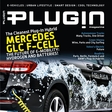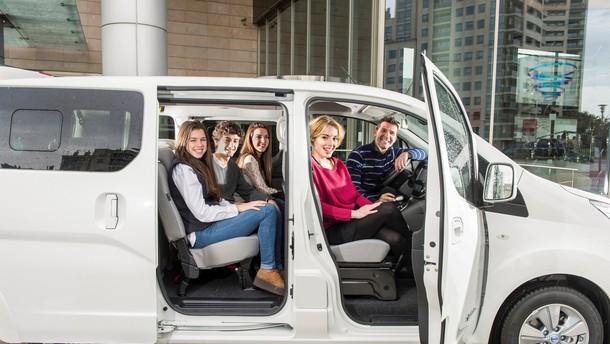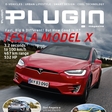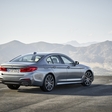
Many of the cars that can be ordered as 7-seaters lose that option in hybrid or plugin-hybrid versions.The batteries are usually stored in the space under the floor of the luggage compartment – and that is the space that would also used by a collapsible 3rd row of seats. So the choice of model becomes even narrower, and models such as the BMW X5 or Audi Q7, which are very competent 7-seaters in versions without hybrid drive, disappear from our 7-seater list in plugin-hybrid versions. There are some new 7-seaters coming (like the plugin-hybrid 225e version of the BMW 2 Gran Tourer this year), but right now the choice remains slim.

Given the wide differences between models that are available, both in price and features, they cannot be compared in a regular test. Therefore, we'll just take a look at what each car has to offer, specifically to big families. Although the Dutch market, where we tested and compared these cars, is relatively small, the choices remain similarly limited in most countries.
A best-seller among the hybrids has been the Toyota Prius+, introduced in 2012 and receiving a facelift in 2015. It comes with seven (swivel) seats, and the last row can still be used by average-sized adults. When all seats are used, this leaves a 200 liter trunk that can only store a moderately-sized stroller. The new model comes with DVD screens on the back of the front seats. According to Toyota, it uses 4.1 liters of gas per 100 km, with its 1.8-liter gas engine combined with 60 kilowatts of electrical power. This combination pulls the Prius+ to 100km/h in 11.3 seconds. When you specifically look for a hybrid to move a big family, the Prius+ clearly offers a lot with its space, its favorable gas mileage, fiscal advantages and its price starting at €31,000. However, when compared with conventional 7-seaters, like the Ford C-Max or Citroen C4 Picasso, the latter still offer more value for money.


A car that offers lots of space for luggage, and even lower energy costs, is the Nissan e-NV200 Evalia. It is a small van with seven seats, and an electric engine with a maximum range of 170 km. This matches the demands of many taxi companies and hotels but, surprisingly, it is not a natural, perfect fit for a first car for a big family. A longer day trip out of town, or a holiday, need careful planning, as you can hardly drive 90 minutes before you need a fast charging port, and overtaking other cars on the highway is nearly impossible, with its maximum speed of 123 km/h. At the fast charging station, the battery can be charged to 80% in 30 minutes (so, with some planning, longer trips will be easier, as the fast-charging network is expanding constantly). With a price starting at €37k (or €31k, if you lease the battery), the car is quite expensive, compared to the Toyota Prius+. Furthermore, on safety, it only scores three stars in the EuroNCAP crash test, whereas Toyota, Tesla and Volvo all have excellent scores. But when you only need the car in the city, drive a lot of kilometers and keep the car for years, the fiscal advantages and low costs for power may weigh the balance in its favor.


An EV that does have an almost conventional range (around 500 kilometers) is the Tesla model S, and it has the option of 7 seats. Its battery can be charged for free at the Tesla-owned supercharger stations that are quite densely spread across North-Western Europe. When you travel, for example, from the Netherlands to Münich (about 825 km), you would need one-to-three stops to charge (depending on your motorway driving style, speed and the size of battery in the car), and thus have less than 15 Euros in costs (when charging at home before departure). Overtaking is easy, with a maximum speed of 250 km/h and acceleration from 0 to 100 km/h in 5.4 seconds. These nice figures have more in common with a sports car than a family car, but come at a price. The 7-seat model starts at €79k, which inhibits a comparison with the Nissan and Toyota models.


Furthermore, it does not have all the comfort of the other models in this price category, although the car is extremely safe, according to both European and US tests. And the two seats in the back of the car are only really suitable for children, but they are very comfortable, and you don't need a booster seat, thus saving space.
The lack of comfort is not an issue in the new Volvo XC90 T8 Twin Engine. Its price comes close to the Tesla, starting at €76k, but the two cars are hard to compare. The Volvo offers more space and comfort for the passengers in the last row, and the second row has an integrated child seat. Furthermore, it does have an entertainment system for passengers in the back of the car. The question of which car provides most value for money depends on the actual use by families. Because of fiscal policies and the free charging, the Tesla may have significantly lower day-to-day cost (if your day trips between charges are longer than the XC90's electric range), although Volvo offers more comfort, especially for the passengers in the last row – and of course more total range, due to it's plugin-hybrid drivetrain.


The last car to consider is Landrover's Range Rover Sport Hybrid. It combines a 3.0 liter V6 turbo diesel with an electric engine, as part of classical hybrid drive. With a price starting at €108k, it clearly comes at a premium cost, though the performance is very strong, as well. Despite its weight at a robust 2428 kg, the combination of diesel and electric power pulls the behemoth to 100 km/h in 6.7 seconds. As far as fuel is concerned, it is clearly a far cry from plugin cars. With 6.4 liters of diesel per 100 km, it does not come close to Volvo's 2.5 liters of gas. And where the RR Sport can just drive on electric for 1.4 km, the Volvo can do 40km. As a family car, it clearly offers all the comfort one could need, though at a high price, and without the fuel economy one expects from a hybrid.

So: is there a viable option for a bigger family searching for an eco-friendly personal transport? Well, currently the choice of EV or hybrid models for big families is extremely limited. And the five models discussed do not all easily meet the demands of an average family wanting clean transport. There have to be some compromises. Range, comfort, price and low or no gas consumption: it's impossible to have them all. But a family of six, however, is not required to be really impressed with some of the cars, like the technically-revolutionary sporty, long-range capable Tesla (although rear-facing seats do no really qualify as comfortable). The Nissan, with its impressive space, lacks a battery capacity that would make longer trips comfortable and carefree. The Volvo and Range Rover have both range and comfort, but like the Tesla, can be too expensive for most families. The Toyota probably comes closest to the ideal, combining space for its passengers and enough range, although you need to budget on luggage, and accept the fact that it's only a hybrid, and can't be driven (aside from a kilometer or two) on electric power only.
Looking ahead, the near future is promising, as batteries become stronger and smaller year-by-year, enabling cars to offer more space and range with each new model, and thus becoming increasingly attractive in comparison to conventional cars.



